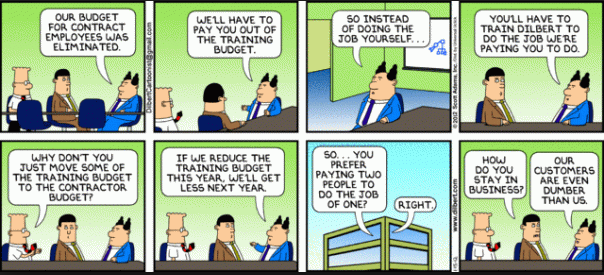Beyond Budgeting… A journey towards real customer service
18/07/2017


Over the past two years or so, a fellow Visiting Fellow – Steve Morlidge – has been introducing me to the term and benefits of “Beyond Budgeting”. This has provided one major “Ah-ha! Moment”. It also chimes with work we have done with Cranfield in developing what we call a “Systems Approach to Project Management” (more of that in a later blog).
Budgeting and Project Planning (particularly large projects) have a lot in common, four of which are:
- They lay out some form of forecast of revenue, costs, profit based on last year’s results plus expectations of stakeholders on the one hand, and on the other forecast of timeframe and spend, along with projected benefits both based on certain assumptions
- Both the Budget and the Project Plan assume that nothing changes in the system (e.g. the environment, markets, technology etc.) and that expectations and requirements remain cast in concrete over the life-time of the budget or the plan
- They are then used by the executive team to track, on the one hand, how revenue, costs and profit are varying (i.e. variance) from budget (like the budget was God-given and correct), and on the other how deliverables are being delivered along with consumption of effort, materials etc. (cost), and projected expenditure to completion against the project plan (like it was God-given and correct)
- By locking-in the budget or project plan in this way (where it is immoveable) THE ONLY PARAMETER YOU CAN ADJUST IS personal (or team) performance – and hence we get into the perversions of personal (or team) incentives and rewards! My Ah-ha! moment (many thanks Steve!)
So the crux to Beyond Budgeting (as well as Planning) is to accept that:
- Assumptions made may be wrong or change
- The world-system and expectations/requirements may change – particularly as budgets and plans span timeframes typically far longer than the timeframes in which the environment/requirements change
- That in budgeting and planning we, as humans (see Daniel Kahneman, Thinking Fast & Slow) always have an optimism bias
And the crux is that in order to be “agile” or “responsive” (as all the big four consulting firms are telling us we need to be IN ORDER TO STAY IN BUSINESS) we can only do so if budgeting and planning functions accept the above.
So how do you track progress in this moving feast – next blog…
Categories & Tags:
Leave a comment on this post:
You might also like…
Keren Tuv: My Cranfield experience studying Renewable Energy
Hello, my name is Keren, I am from London, UK, and I am studying Renewable Energy MSc. My journey to discovering Cranfield University began when I first decided to return to academia to pursue ...
3D Metal Manufacturing in space: A look into the future
David Rico Sierra, Research Fellow in Additive Manufacturing, was recently involved in an exciting project to manufacture parts using 3D printers in space. Here he reflects on his time working with Airbus in Toulouse… ...
A Legacy of Courage: From India to Britain, Three Generations Find Their Home
My story begins with my grandfather, who plucked up the courage to travel aboard at the age of 22 and start a new life in the UK. I don’t think he would have thought that ...
Cranfield to JLR: mastering mechatronics for a dream career
My name is Jerin Tom, and in 2023 I graduated from Cranfield with an MSc in Automotive Mechatronics. Originally from India, I've always been fascinated by the world of automobiles. Why Cranfield and the ...
Bringing the vision of advanced air mobility closer to reality
Experts at Cranfield University led by Professor Antonios Tsourdos, Head of the Autonomous and Cyber-Physical Systems Centre, are part of the Air Mobility Ecosystem Consortium (AMEC), which aims to demonstrate the commercial and operational ...
Using grey literature in your research: A short guide
As you research and write your thesis, you might come across, or be looking for, ‘grey literature’. This is quite simply material that is either unpublished, or published but not in a commercial form. Types ...






